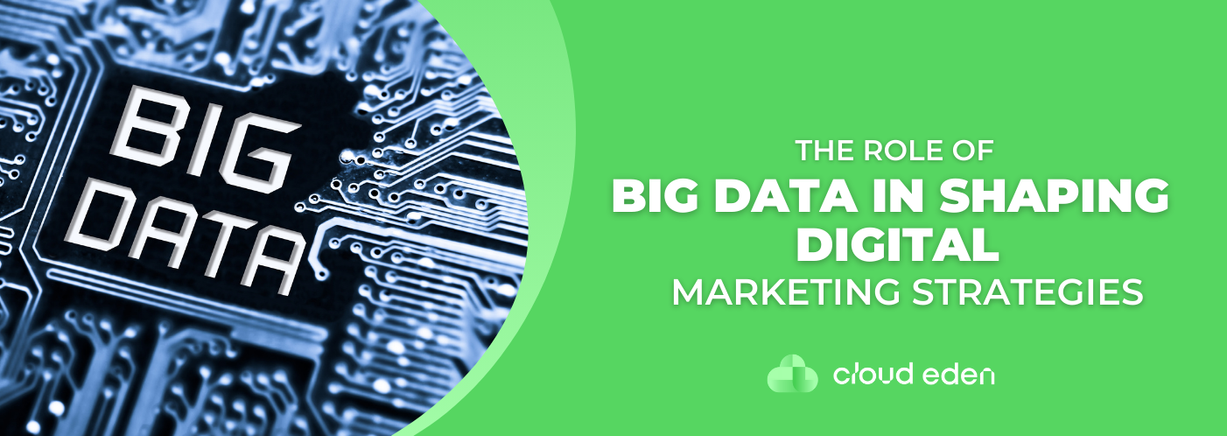The Role of Big Data in Shaping Digital Marketing Strategies

Table of Contents
1. Introduction
- Overview of Big Data
- Importance in Digital Marketing
2. Understanding Big Data
- Definition and Characteristics
- The Three Vs: Volume, Velocity, Variety
3. The Impact of Big Data on Digital Marketing
- Enhanced Customer Insights
- Improved Customer Segmentation
- Predictive Analytics
- Enhanced Personalization
- Optimized Advertising Spend
4. Case Studies: Big Data in Action
- Netflix: Revolutionizing Content Recommendations
- Amazon: Personalizing the Shopping Experience
- Starbucks: Crafting a Data-Driven Customer Experience
5. Challenges and Considerations
- Data Privacy and Security
- Data Quality
- Integration with Existing Systems
- Interpreting Data
6. The Future of Big Data in Digital Marketing
- Artificial Intelligence and Machine Learning
- Real-Time Data Analytics
- Increased Focus on Customer Experience
- Data-Driven Creativity
7. Conclusion
- Summary of Big Data's Role
- Future Trends and Opportunities
Big data has transformed the digital marketing landscape, empowering businesses to craft smarter, more impactful campaigns. This detailed exploration delves into the role of big data in shaping digital marketing strategies, providing an in-depth analysis of its impact, benefits, and future potential. By understanding the nuances of big data, businesses can enhance their marketing efforts, drive better customer engagement, and achieve higher ROI.
Understanding Big Data
Big data
refers to the vast volumes of structured and unstructured data generated from various sources, including social media, transactional records, sensor data, and more. The key characteristics of big data are often described by the three Vs: volume, velocity, and variety. These attributes highlight the massive amount of data, the speed at which it is generated and processed, and the diverse types of data available.
The Impact of Big Data on Digital Marketing
Enhanced Customer Insights
One of the most significant impacts of big data on digital marketing is the ability to gain deeper customer insights. By analyzing data from multiple touchpoints, marketers can understand customer behavior, preferences, and pain points more accurately. This granular understanding allows for the creation of highly targeted and personalized marketing campaigns.
Improved Customer Segmentation
Big data enables marketers to segment their audience more effectively. Traditional segmentation methods often relied on broad categories, but with big data, segmentation can be done based on more specific criteria such as purchase history, browsing behavior, social media interactions, and more. This refined segmentation ensures that marketing messages resonate with the intended audience, increasing the likelihood of conversion.
Predictive Analytics
Predictive analytics, powered by big data, allows marketers to anticipate future trends and customer behaviors. By leveraging historical data and machine learning algorithms, businesses can forecast demand, optimize inventory, and tailor their marketing strategies accordingly. This proactive approach helps in staying ahead of competitors and meeting customer needs more efficiently.

Enhanced Personalization
Personalization has become a cornerstone of effective digital marketing. Big data enables marketers to deliver personalized experiences at scale. By analyzing individual customer data, businesses can create personalized content, product recommendations, and offers that are more likely to resonate with customers. This level of personalization not only enhances customer satisfaction but also drives loyalty and repeat business.
Optimized Advertising Spend
Big data helps in
optimizing advertising spend by providing insights into which channels, campaigns, and strategies are most effective. Marketers can track and analyze the performance of their ads in real-time, allowing for adjustments on the fly. This data-driven approach ensures that marketing budgets are allocated to the most impactful activities, maximizing ROI.
Case Studies: Big Data in Action
Netflix: Revolutionizing Content Recommendations
Netflix is a prime example of how big data can transform a business. The streaming giant uses big data to analyze viewing habits, preferences, and user interactions. This data-driven approach allows Netflix to recommend content tailored to individual users, keeping them engaged and subscribed. The recommendation engine powered by big data has been a critical factor in Netflix's success, leading to increased viewer satisfaction and retention.
Amazon: Personalizing the Shopping Experience
Amazon leverages big data to create a personalized shopping experience for its customers. By analyzing purchase history, browsing behavior, and other data points, Amazon provides personalized product recommendations and targeted marketing messages. This personalized approach not only drives sales but also enhances customer loyalty and satisfaction.
Starbucks: Crafting a Data-Driven Customer Experience
Starbucks utilizes big data to optimize its marketing campaigns and improve customer experiences. By analyzing data from its loyalty program, mobile app, and in-store purchases, Starbucks can tailor its marketing efforts to individual preferences. This approach allows Starbucks to send personalized offers and recommendations to customers, enhancing their overall experience and driving repeat business.

Challenges and Considerations
While the benefits of big data in digital marketing are substantial, there are also challenges and considerations that businesses must address.
Data Privacy and Security
The collection and analysis of large volumes of data raise concerns about data privacy and security. Businesses must ensure that they comply with data protection regulations such as GDPR and CCPA. Implementing robust data security measures is crucial to protect customer information and maintain trust.
Data Quality
The effectiveness of big data analytics depends on the quality of the data collected. Inaccurate or incomplete data can lead to misguided insights and decisions. Businesses must invest in data cleaning and validation processes to ensure that their data is accurate and reliable.
Integration with Existing Systems
Integrating big data analytics with existing marketing systems and processes can be challenging. Businesses need to ensure that their data infrastructure can handle the volume and complexity of big data. Investing in the right technology and talent is essential to overcome these challenges.
Interpreting Data
The sheer volume of data can be overwhelming, making it difficult to extract actionable insights. Businesses must have skilled data analysts and data scientists who can interpret the data and provide meaningful recommendations. Investing in training and development is crucial to build a competent team.

The Future of Big Data in Digital Marketing
As technology continues to advance, the role of big data in digital marketing is set to grow even further. Here are some trends to watch out for:
Artificial Intelligence and Machine Learning
The integration of artificial intelligence (AI) and machine learning (ML) with big data analytics will enable even more sophisticated insights and automation. AI and ML can analyze vast datasets at unprecedented speeds, uncovering patterns and trends that were previously impossible to detect. This will lead to more accurate predictions and more effective marketing strategies.
Real-Time Data Analytics
Real-time data analytics will become increasingly important in digital marketing. Businesses will be able to analyze data as it is generated, allowing for immediate adjustments to marketing campaigns. This real-time approach will enhance responsiveness and agility, ensuring that marketing efforts are always aligned with current customer behavior and market conditions.
Increased Focus on Customer Experience
Big data will continue to play a crucial role in enhancing the customer experience. Businesses will use data to understand the customer journey better and identify pain points. This understanding will enable the creation of seamless and personalized experiences that meet customer expectations and drive loyalty.
Data-Driven Creativity
As big data becomes more integrated into marketing strategies, there will be a shift towards data-driven creativity. Marketers will use data insights to inform their creative decisions, resulting in more relevant and engaging content. This fusion of data and creativity will set new standards for marketing excellence.
Conclusion
The role of big data in shaping digital marketing strategies cannot be overstated. From enhancing customer insights and personalization to optimizing advertising spend and predicting future trends, big data has revolutionized the way businesses approach marketing. By leveraging the power of big data, businesses can create more effective, efficient, and customer-centric marketing strategies that drive growth and success.
As we move into the future, the integration of AI, real-time analytics, and a focus on customer experience will further elevate the impact of big data on digital marketing. Businesses that embrace these advancements and overcome the associated challenges will be well-positioned to thrive in an increasingly data-driven world.
Feel free to like, share, follow us and reach out to us, so that your business can make the best our of Big data.
Welcome To Our Blog





